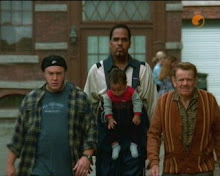1. Why doesn’t he do a commentary track? Slade is obviously well-represented in the feature-length making-of documentary and introduces and provides context for deleted and extended scenes, but he’s not on either of the two commentary tracks over the movie — he leaves those to Stephenie Meyer and producer Wyck Godfrey, and Stewart and Robert Pattinson (she’s in Montreal, jealous that he’s in L.A. eating In-N-Out). “It’s a choice I made after doing my first ever and last ever commentary on my first film Hard Candy,” he says. “I did a commentary for that and found it such an unsatisfactory experience, personally, that I vowed never to do it again, because I’m not very good at it. You work for a year-and-a-half, two years, however long it is on a film, and it’s a very personal experience as well as a very public experience. There’s so much catharsis that goes into it, and then you end up sitting in a little room and you reduce what was an intense amount of work down to a crappy, silly little anecdote usually. ‘It was raining that day.’ [Laughs] I just found it to be really disheartening, and, like I say, I’m not really good at it. I didn’t do one for my second film [30 Days of Night] either.”
2. Listening to Stephenie and Wyck’s commentary, you hear a lot of the discussions that went on on-set, like debating how Jacob should kiss Bella both times, and you realize what a collaborative experience making a Twilight film must be. Is that helpful or more challenging as a director? “If you’re in sync with everybody, the collaboration is second nature. What you’re doing is looking for the best ideas and utilizing them. Certainly there is a lot of collaboration, but there is also a lot of clarity that has to be had in the vision that you have for the film when you come in as the director. Without that, there’s no bullseye to be aiming for,” he says. “There’s all kinds of things that we can discuss, but at the end of the day, I’m the guy that has to go off and get the shot… Film is always a fight because you’re the person, as the director, with a clear picture in your head of what you think is really exciting, and you’re just trying to convince a bunch of other people to buy into that. That’s always gonna be a tough ride, particularly when there’s two very successful films that have gone beforehand. There’s a tendency to think safely. ‘We have something that works. Why would we change this or that?’ [...]
Den Rest findet ihr bei TwiCrackAddict
byBruni















































Keine Kommentare:
Kommentar veröffentlichen
Hinweis: Nur ein Mitglied dieses Blogs kann Kommentare posten.